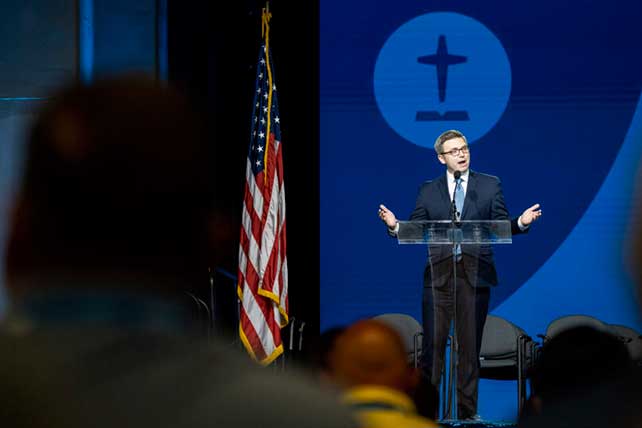(RNS) — The chief ethicist for the nation’s largest Protestant denomination wants the federal government to clamp down on in-vitro fertilization, saying it causes harm to children and their mothers.
Many infertile couples who undergo IVF treatment are unaware of the moral danger it poses, Brent Leatherwood, president of the Southern Baptist Convention’s Ethics and Religious Liberty Commission, wrote in a letter to the U.S. Senate last week.
“We urge legislators to develop and implement a system of federal oversight that protects and informs women and ensures embryos are treated with care, even as we oppose the general practice of IVF,” Leatherwood wrote.
RELATED: For Infertile Couples, the Fate of Frozen Embryos Is Deeply Personal
Earlier this year, the Alabama Supreme Court made national headlines with a ruling that frozen embryos created during IVF were protected by the state’s wrongful death law. The state’s chief justice went even further, saying in a concurring opinion that “embryos cannot be wrongfully destroyed without incurring the wrath of a holy God, who views the destruction of His image as an affront to Himself.”
That ruling, in a case where embryos were destroyed in a freak accident, shut down Alabama’s fertility clinics, leading Kay Ivey, the state’s Southern Baptist governor, to quickly sign a new law protecting clinics by limiting their liability.
“I am pleased to sign this important, short-term measure into law so that couples in Alabama hoping and praying to be parents can grow their families through IVF,” Ivey said at the time.
During the IVF process, doctors often fertilize more eggs than can be implanted at one time. The excess embryos are vitrified — a freezing process that turns them glass-like — and stored in liquid nitrogen for future IVF attempts. By some estimates, more than a million embryos are currently frozen in storage.
RELATED: ‘You Are a Viper’—ERLC’s Brent Leatherwood Blasts Leaker of Alleged School Shooter Manifesto
While conservative Christian groups like the SBC have long opposed abortion, saying life begins at conception, they’ve been largely quiet about IVF itself. Any criticism of the process has been limited to concerns about the fate of frozen embryos created during IVF, especially if those leftover embryos were used for research or discarded.
That’s in part because of what Dena Davis, an emerita professor of religion at Lehigh University who taught bioethics, calls the “IVF problem.”
Unlike abortion, which is intended to end a pregnancy, the goal of IVF is for more children to be born — something religious people generally approve of, Davis told Religion News Service in an interview earlier this year.
“That is at the heart of conservative religious understanding of how the world works,” she said. “You get married, you have kids.”
Davis also suspects abortion foes are more likely to know someone who needs help conceiving and are likely more empathetic with someone using IVF than they are with someone who chooses abortion.
Southern Baptists passed a series of resolutions, starting in 1999, opposing the use of embryos for research, genetic editing of embryos, cloning or other technology that would involve destroying embryos — for the same reasons Southern Baptists oppose abortion, believing life has already begun in the frozen embryo stage.
While Southern Baptists have raised ethical concerns about IVF in the past, the denomination’s leaders have not opposed the practice.

